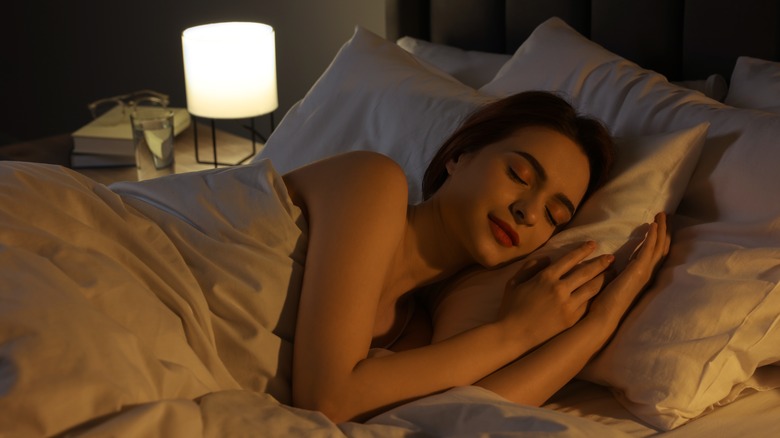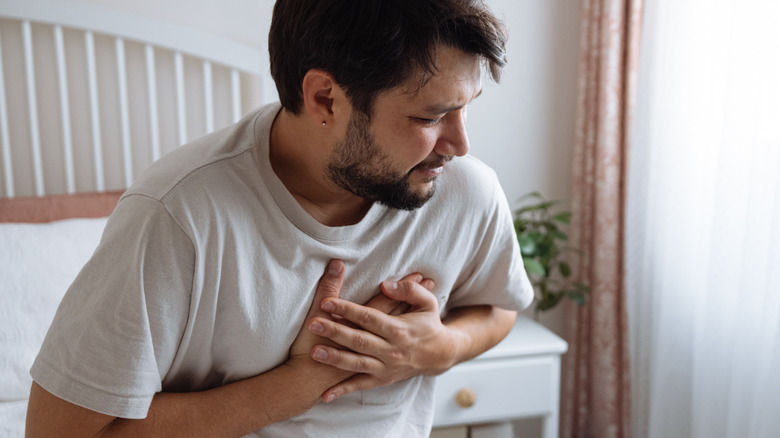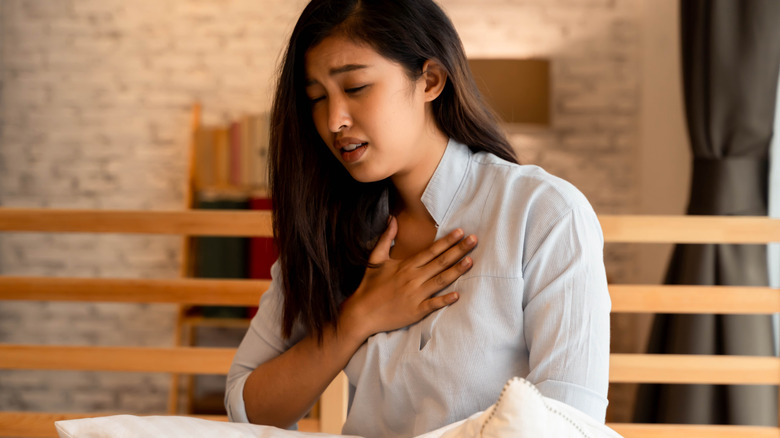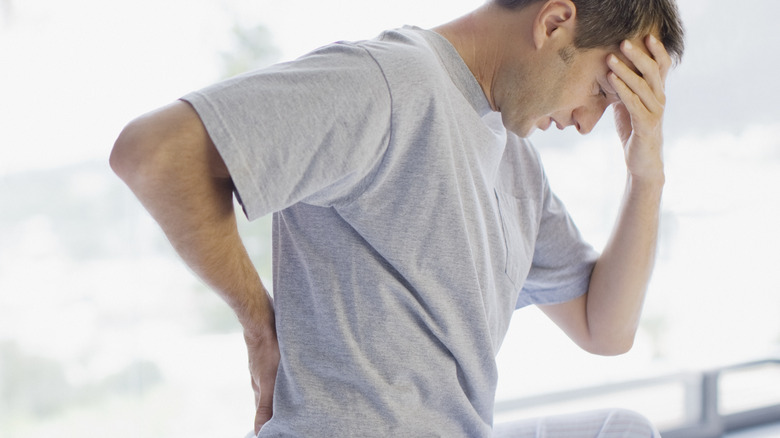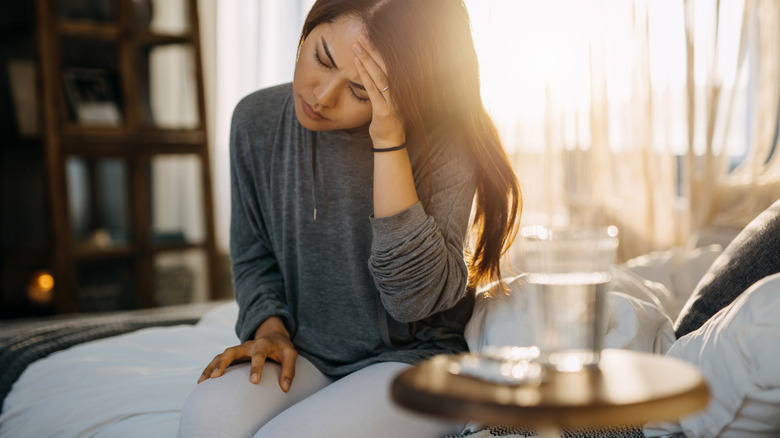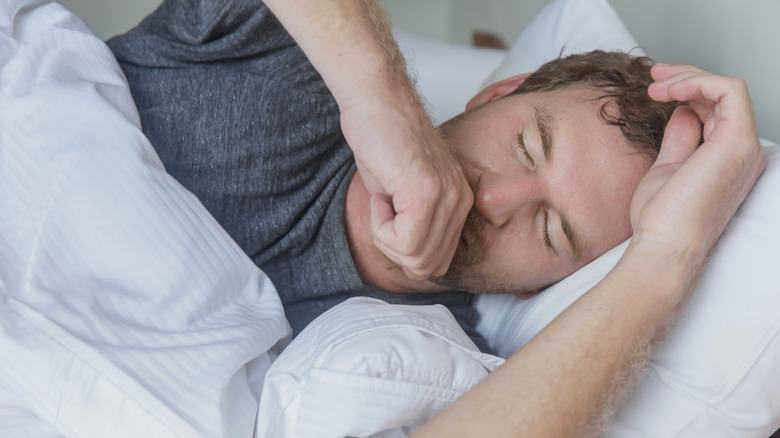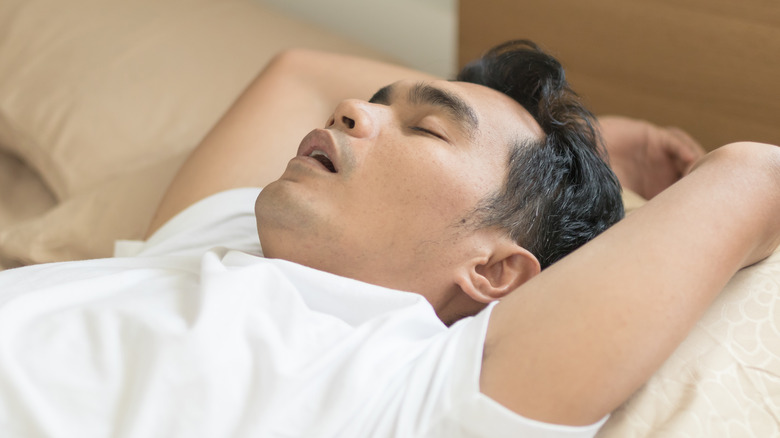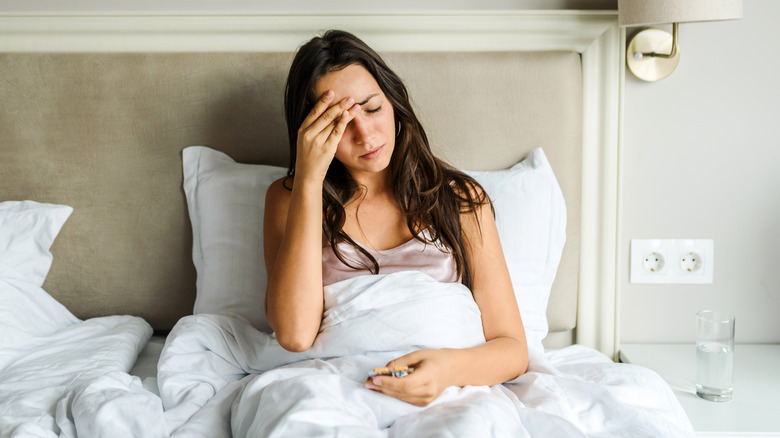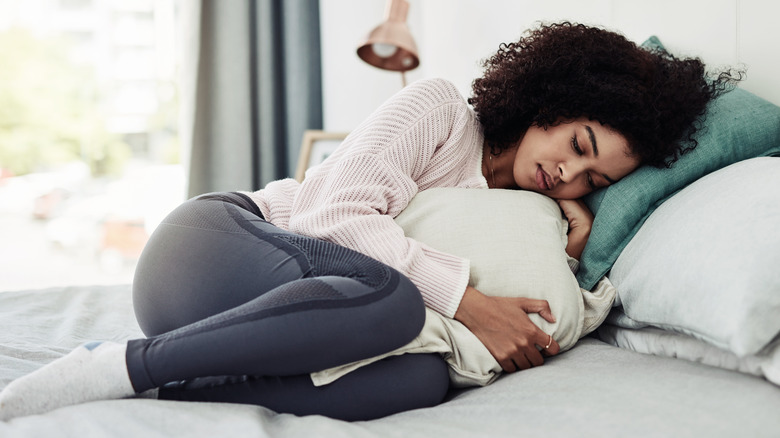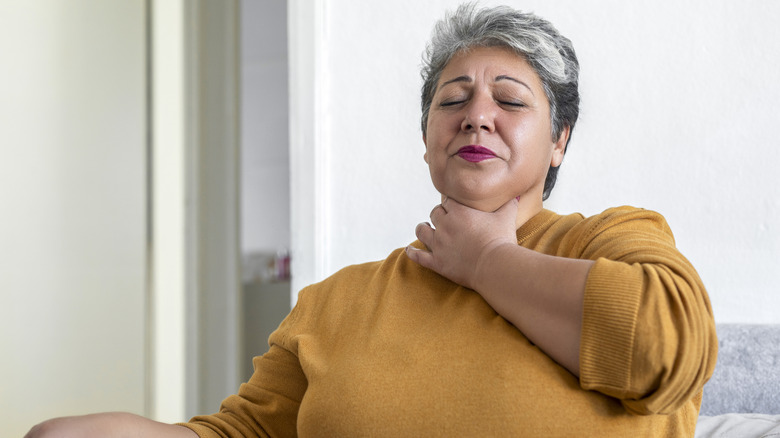Serious Medical Events You Can Experience While Sleeping
In the eight or so hours per night that you spend asleep, there are a number of strange things that can happen to you, according to Medical News Today. These so-called parasomnias can range from talking in your sleep to sleepwalking to sending potentially damaging or embarrassing text messages. It's not clear what causes these parasomnias, but they can be disruptive to both you and your partner and rob you of some much-needed rest.
There are also physical problems that people can develop that disrupt their sleep (via the American Psychiatric Association). These include sleep apnea, in which a person's airway becomes obstructed during the night. This condition affects up to 15% of middle-aged adults and more than 20% of older adults. However, there are even more serious and unexpected ailments that can befall a person when they lay down their head for the night. These are some of the more troubling conditions that can plague you during the night.
Cardiac arrest
You may think that a heart attack is something that can only happen to you when you're wide awake and doing some kind of physical or strenuous activity. However, a heart attack can most definitely occur during sleep, according to the Health Site. When a person is sleeping, their blood pressure and metabolic rate can be reduced, which can impact the flow of blood to the heart and lead to a heart attack.
According to a 2021 study published in Heart Rhythm, women are more likely to suffer cardiac arrest during sleep than men. The study revealed that, of the people featured in the study, 25.4% of women suffered cardiac arrest at night versus 20.6% of men. However, there were other factors that could increase a person's risk of having a cardiac event at night versus during the day. These included the presence of lung disease and a history of smoking.
Respiratory problems
Obstructive sleep apnea (OSA) is a common sleep-related disorder in which a person's upper airway collapses while they're sleeping (via UpToDate). Anywhere from 15 to 30% of men and 10 to 15% of women suffer from sleep apnea. A 2009 study published in the Journal of the American Medical Association revealed that people who suffer from OSA could be 2.5 times more likely to die between midnight and six a.m. than those who do not have the condition.
According to SleepApnea.org, death can occur from OSA when a person doesn't resume breathing after an apnea-induced pause. In addition, other risk factors can also contribute to death from sleep apnea, including heart disease, high blood pressure. Similarly, a 2008 study published in Sleep showed that 42% of the deaths associated with sleep apnea were attributed to cardiovascular disease or stroke. Other risk factors for sleep apnea patients included smoking, alcohol use, high cholesterol, and irregular sleep patterns.
Stroke
According to Heart & Stroke, 25% of strokes happen when people are asleep. This can often present itself as what is known as a "wake-up stroke," according to a 2017 study published in Topics in Magnetic Resonance Imaging. A wake-up stroke occurs when a person goes to sleep feeling fine and suddenly awakens with stroke symptoms. The study reveals that approximately 20% of strokes are wake-up strokes, although the cause is still unclear.
The danger of strokes that happen during sleep is that they are often painless, and people are not even aware that anything is happening until they wake up (via SingHealth). Because of this, a patient who is experiencing a wake-up stroke may not get the treatment that they need in a timely fashion. In some cases, a person with a wake-up stroke may even decide to go back to bed and "sleep it off." This could be very serious and delay that person getting help. It's been shown that people who have their stroke symptoms addressed quickly are in less need of long-term care than people who don't.
Blood sugar fluctuations
People who suffer from type 1 diabetes can experience what is known as "Dead in Bed Syndrome," according to Diabetes.co.uk. This is an unexplained phenomenon in which a type 1 diabetic goes to bed seemingly healthy and, the next morning, is found to have died in their sleep. While a rare occurrence, Dead in Bed Syndrome may account for up to 6% of deaths for diabetics under 40. The condition seems to be limited to type 1 diabetes, with no significant cases being reported among type 2 diabetics.
According to a 2015 study published in the Journal of Social Health and Diabetes, there is no clear cut cause for Dead in Bed Syndrome. However, there are a few potential causes, including nocturnal hypoglycemia, which then leads to cardiac arrhythmia. As such, the study proposes trying to avoid nocturnal hypoglycemia as a possible preventative measure. For type 1 diabetics, the most common cause of hypoglycemia is an imbalance in food intake, insulin, and physical activity. It's important to work with your healthcare provider to make sure you are managing your condition correctly.
Carbon monoxide poisoning
Carbon monoxide poisoning can happen without a person even realizing it, because carbon monoxide gas has no smell or taste, making it very difficult to detect (via Mayo Clinic). In addition, some of the symptoms could even be mistaken for the flu without a person realizing that they've been poisoned. These symptoms include headaches, nausea, shortness of breath, and dizziness.
According to the Centers for Disease Control and Prevention, "unintentional carbon monoxide poisoning not linked to fires" accounts for over 100,000 trips to the emergency room, more than 14,000 hospitalizations, and over 400 deaths in the United States every year. Gas from barbecue grills, fireplaces, gas ranges, and furnaces can all produce carbon monoxide gas, which can build up in poorly ventilated areas. In order to prevent carbon monoxide poisoning, you should install a battery-operated carbon monoxide detector. Additionally, any carbon monoxide-producing appliances in your house should be checked routinely by a qualified technician.
Breathing suppression
If you're having a hard time sleeping, you may decide to take sleeping pills such as Lunesta, Halcion, or Ambien to help you get your nights back on track. However, according to the Mayo Clinic, if you mix sleeping pills with other substances like alcohol or opioids, you run the risk of the sedative effect of the pills being amplified. This can result in slow breathing and unresponsiveness.
The Sleep Foundation also reports that a lower respiratory rate while sleeping can also be caused by a number of other conditions. These include sleep apnea, asthma, pneumonia, and allergic reactions. Additionally, people can develop rapid breathing, known as either tachypnea or hyperventilation, during sleep. Like a lower respiratory rate, these incidences of higher respiratory activity can be triggered by asthma and lung problems, such as chronic obstructive pulmonary disease, or COPD. It can also be brought on by heart failure, anxiety, and panic attacks. If you or your partner notice that you are having any respiratory issues while sleeping, you should consult your doctor right away.
Brain bleeding
People who have a traumatic brain injury (TBI) sometimes go to sleep not long after, not realizing the severity of their condition (via Hackensack Meridian Health). If you experience a head injury and try to "sleep off" your symptoms, you may not pick up on some telltale symptoms that could be an indicator of a serious injury or bleeding in the brain. These symptoms include headaches, one dilated pupil, numbness, and slurred speech.
The Brain Trauma Foundation reports that TBI is responsible for a large number of deaths and disabilities in the U.S., with approximately 30% of all injury-related deaths being attributed to brain injury. This doesn't mean that you can't go to sleep after a TBI incident. Healthline notes that, if you can carry on a conversation, walk without difficulty, or your pupils aren't dilated, then sleep is not only probably safe but could be an important part of the recovery process. However, if you have any kind of head injury, you should consult with a medical professional about the next steps before you decide to go to sleep or engage in any activity.
Seizure
According to the Centers for Disease Control and Prevention, people who suffer from epilepsy could be at risk of experiencing what is known as Sudden Unexpected Death in Epilepsy (SUDEP). This is when death occurs for people with epilepsy unrelated to a specific injury or known cause. A 2015 study published in Sleep Medicine found that 58% of people who experienced SUDEP were sleeping at the time.
It's not entirely known what causes SUDEP, much less why it happens during the night. However, the Epilepsy Foundation notes that issues related to heart rhythm, brain function, and breathing could all be responsible. During a seizure, a person may stop breathing. If they don't resume breathing quickly, the flow of oxygen to both the heart and brain can be disrupted. Additionally, a seizure could impact brain stem functions. In particular, the areas related to breathing and heart rate could be affected, leading to a dangerous and possibly deadly outcome.
Choking in your sleep
As frightening and unpleasant as it may sound, choking on your own vomit during sleep is something that could happen to you under the wrong circumstances (via Erie News Now). It happens when the stomach contents are regurgiated during sleep and become lodged in the esophagus. In some cases, this can be a result of eating or drinking too much, but it can also be a symptom of acid reflux. Ideally, if you're concerned about vomiting during the night, you should try sleeping with your head elevated or on your left side to alleviate your symptoms and avoid choking.
If you suffer from gastroesophageal reflux disease, or GERD, you can also experience the stomach forcing its contents back into your airway, causing you to choke (via SleepTest.co.uk). If you're experiencing these kinds of symptoms during the night, it's important to seek help from a medical professional. Treatments ranging from positional therapy to healthy changes in your diet and lifestyle might help ease your symptoms and help you make it through the night safely.

